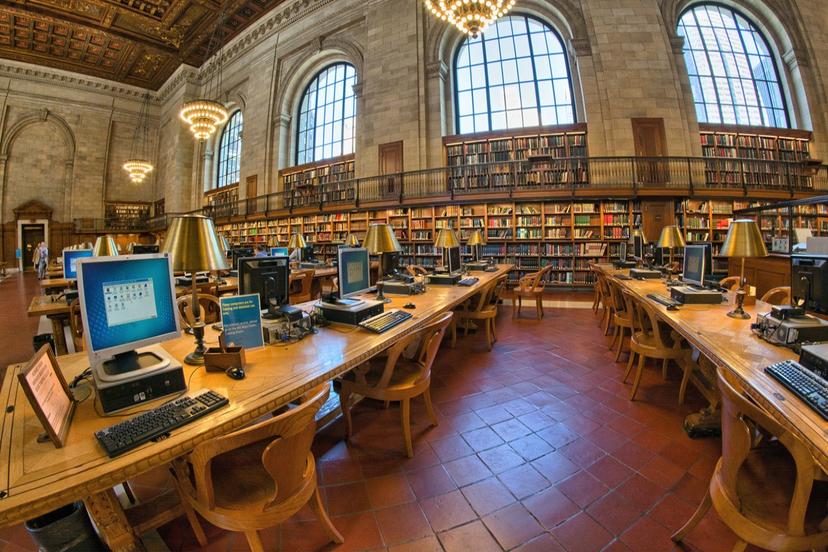Library and Information Services

Structure
The field of information services is made up of a variety of professionals who help meet the growing demands of our information-based society. The designation information professional encompasses not only librarians and information scientists but any of a number of professionals who organize, analyze, retrieve, and disseminate recorded knowledge. Information professionals may work anywhere from the traditional library setting to such places as research institutes and information brokerages. The structure of the information services industry is expanding constantly.
Perhaps the fastest growing category of libraries in the United States includes school library media centers. There are nearly 98,500 libraries in elementary, junior high, and high schools. A generation ago there were approximately 20,000 such libraries.
The school library media center has become an indispensable part of education. In it, a carefully selected collection of books, magazines, newspapers, pictures, films, videotapes, recordings, CD-ROMs, DVDs, and other materials are brought together, indexed, and arranged for convenient use. The school library media specialist is a part of the teaching team of the school and works with the other teachers in planning and determining resources to be included in the teaching curriculum.
There are approximately 3,094 academic libraries of all types serving millions of students enrolled in institutions of higher education: junior colleges, colleges, and universities.
University libraries collect publications in many languages and develop highly specialized collections of books, periodicals, manuscripts, and other materials. They are equipped for scholars and for graduate students who are preparing themselves for scholarly careers. To make the library's collection useful, each university library needs a specialized staff to offer expert assistance in many subjects and in many languages.
College libraries have more modest goals than university libraries because they serve academic institutions primarily concerned with teaching, although some colleges offer graduate degrees and many college teachers spend part of their time in research and writing. College librarians, like school library media specialists, work closely with members of the teaching faculty in selecting materials that will be useful to undergraduate students.
Community college libraries serve two-year colleges. Frequently called learning resource centers, these libraries emphasize the use of a wide variety of films, tapes, and other audiovisual materials, as well as books. Their collections are usually smaller than those of four-year college libraries, but they are carefully selected and organized to support the range of academic, paraprofessional, and technical courses offered.
Public libraries provide a variety of services for people of all ages, from the youngest toddlers who just have learned to enjoy picture books to retired adults who have renewed their interest in subjects for which they had little time during their working years. Public libraries range in size from the New York Public Library with millions of volumes and 88 branch libraries to smaller rural and town libraries with 10,000 to 15,000 volumes. Regardless of size, they have a common goal of providing information and recreational reading materials to all people. Many also provide computers so patrons can access forms of electronic media, like CD-ROMs, DVDs, online database services, and the Internet. Some public libraries provide services such as an information and referral center for people who need help in using other community services. Information on voter registration, employment offices, health and family services, and other services may also be available, and individuals are guided to the appropriate agencies.
Special libraries provide specialized information services to many trade organizations, research laboratories, businesses, government agencies, art museums, hospitals, newspapers, publishers, and others. Because these libraries generally are concerned with highly specialized subjects, they have relatively small collections. A few thousand volumes may be found in a large special library. These libraries work very closely with the employees of the company or members of the organization and provide their patrons with access to esoteric materials. The special librarians who work in them often have supplemental training or previous academic experience in the subject of the special library.
The rapid expansion of government services in many areas has stimulated the growth of library services and created new opportunities for special librarians in federal and state governments. The libraries at the top of the federal network are the Library of Congress, the National Library of Medicine, and the National Library of Agriculture. These three great libraries have developed extensive collections in their fields and serve the entire country.
Almost all departments of the executive branch of the government have special libraries or other types of information agencies outside of traditional libraries settings that provide the information needed to carry on the work of these agencies. Located near Washington, D.C., are libraries and information agencies serving all branches of the armed forces, Veterans Administration hospitals, federal research laboratories, and other field agencies. In state governments there are historical libraries and archives, legislative reference libraries, law libraries, public library extension agencies, and many smaller libraries that serve specialized branches of the state government.
An increasing number of information professionals are working as information brokers. Information brokers can be individuals working on a freelance basis or companies employing information specialists. In either case, information brokers provide information to clients for a fee. Rather than employing their own full-time specialists, clients can save a great deal of money by outsourcing, or hiring outside individuals or companies to perform searches of computer databases and manual sources, to locate documents, to compile bibliographies, and to provide all sorts of information.
As today's information society continues to expand, there will be more opportunities for work in these alternative settings.
